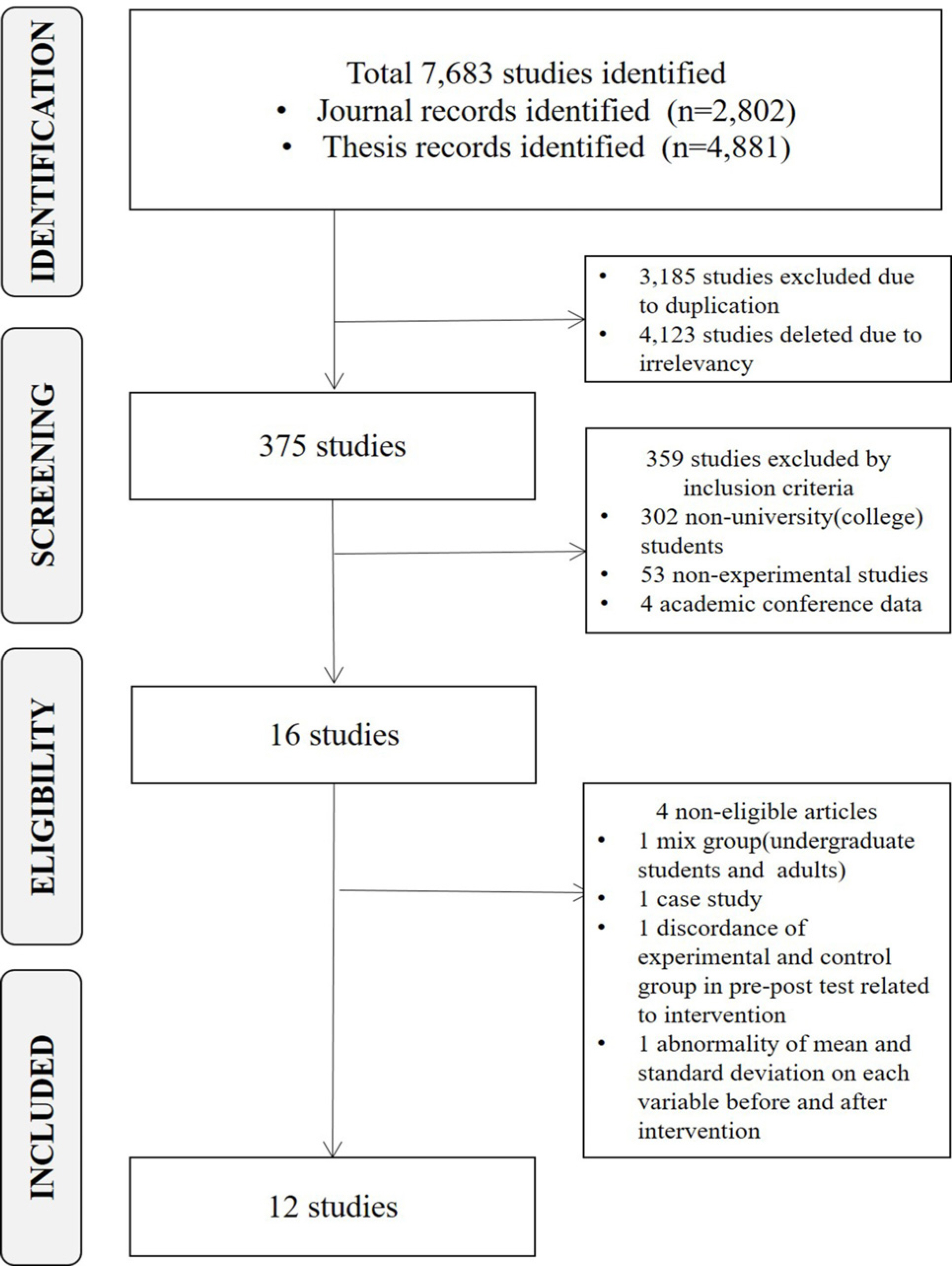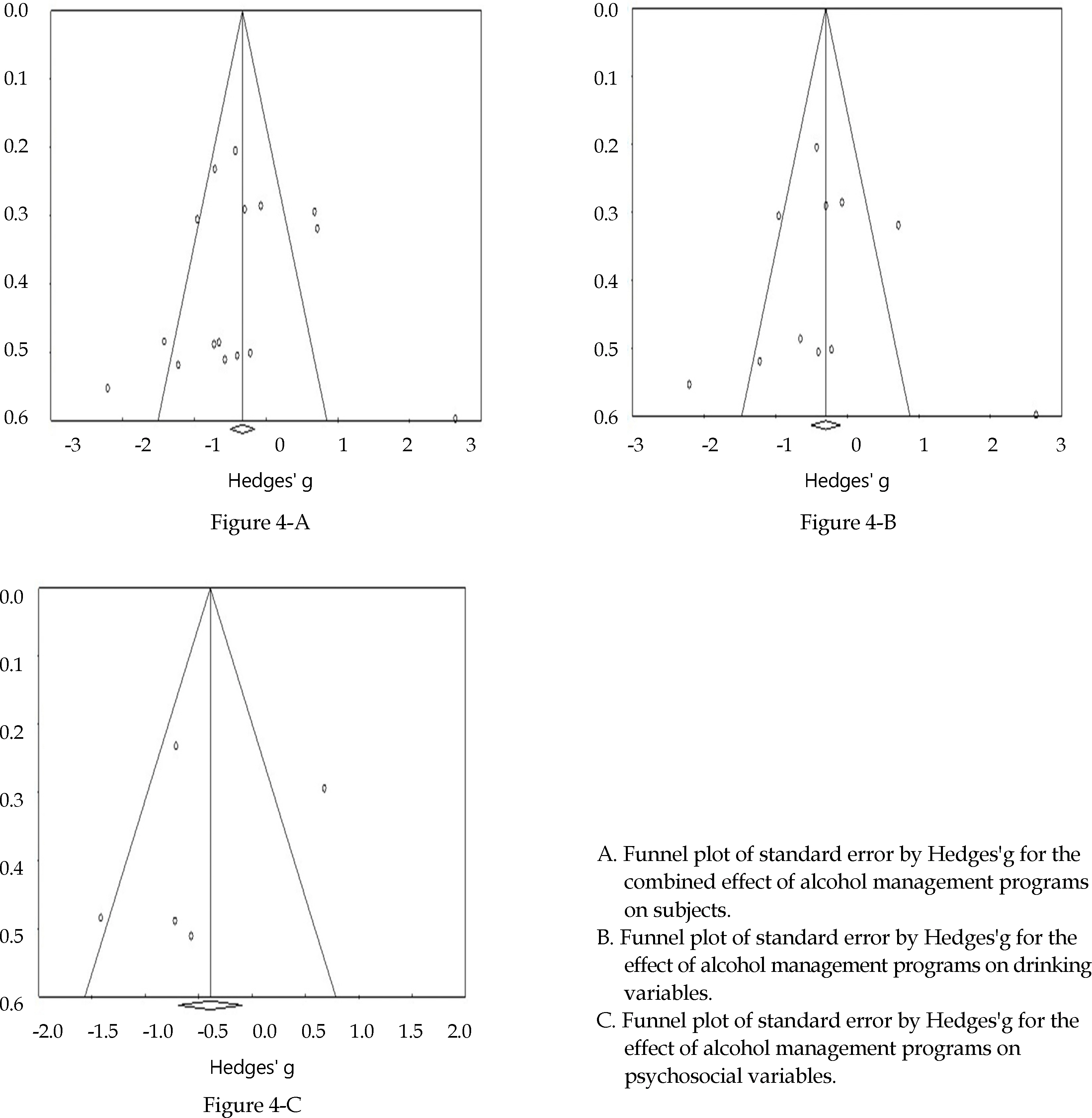J Korean Acad Community Health Nurs.
2018 Mar;29(1):120-132. 10.12799/jkachn.2018.29.1.120.
Effects of Alcohol Management Programs for University Students in Korea: A Systematic Review and Meta-analysis
- Affiliations
-
- 1Department of Nursing, Cheongju University, Cheongju, Korea. beaulip@cju.ac.kr
- KMID: 2415309
- DOI: http://doi.org/10.12799/jkachn.2018.29.1.120
Abstract
- PURPOSE
This study is a systematic review and meta-analysis designed to investigate effects of alcohol management programs for Korean university students.
METHODS
Research results published until October 14, 2016 were systematically collected in accordance with the PRISMA (Preferred Reporting Items for Systematic Reviews and Meta-Analysis). A total of 12 papers were selected for the meta-analysis. To estimate the effect size, meta-analysis of the studies was performed with the Comprehensive Meta-Analysis 3.0.
RESULTS
The mean effect size of 12 studies in total (Hedges' g=-0.36; 95% Confidence Interval [CI]: -0.76~0.05) was not significant statistically. In a study of college students classified as problematic drinking (total of 9), the drinking program showed a median effect size of Hedges' g=-0.57(95% CI: -0.96~-0.18). Results of the drinking-related outcome variables showed a significant effect size (Hedges' g=-0.61; 95% CI: -1.10~-0.13), but psychosocial related outcome variables were not significant (Hedges' g=-0.50; 95% CI: -1.24~0.23).
CONCLUSION
It can be seen that the alcohol management program for college students has a significant effect on controlling the problem drinking of college students. In addition, application of a differentiated drinking program with problem drinkers selected as a risk group will be effective in controlling drinking and drinking related factors.
Keyword
MeSH Terms
Figure
Reference
-
References
1. National Institute on Alcohol Abuse and Alcoholism. College drinking [Internet]. Bethesda: National Institute on Alcohol Abuse and Alcoholism;2015. [cited 2017 November 29]. Available from: www.collegedrinkingprevention.gov/CollegeAIM.2. Korea Centers for Disease Control and Prevention. 2015 health behavior and chronic disease statistics [Internet]. Cheongju: Korea Centers for Disease Control and Prevention;2016. [cited 2017 August 16]. Available from:. http://cdc.go.kr.3. Chun S, Sohn A, Song CH, Lee JY, Kim SK. Health and behavioral consequences of binge drinking in college: A national survey of students at 60 campuses. Journal of Korean Alcohol Science. 2003; 4(2):119–135.4. Elliott MA, Ainsworth K. Predicting university undergraduates' binge-drinking behavior: A comparative test of the one-and two-component theories of planned behavior. Addictive Behaviors. 2012; 37:92–101. https://doi.org/10.1016/j.addbeh.2011.09.005.5. Kho YM, Hyun MH, Park JS. The mediating effect of drinking refusal self-efficacy on the relationship between drinking restraint and drinking behaviors in college students. Korean Journal of Health Psychology. 2009; 14(4):891–901. https://doi.org/10.17315/kjhp.2009.14.4.012.6. Nam CY. The relations of stress, drinking trait, and problem behavior after drinking among the college students in Jeju. Journal of Welfare for the Correction. 2008; 12:27–47.7. Lee YB, Park JK. The effects of university student's drinking motives and adjustment to college life on problematic drinking: Dysfunctional beliefs as a mediator. Cognitive Behavior Therapy in Korea. 2015; 15(2):359–376.8. Yoo CY, Lee JK. Impacts of psychosocial influential factors on problem drinking among college students -Moderating effects of protective factors-. Journal of Institute for Social Sciences. 2016; 27(4):93–121. https://doi.org/10.16881/jss.2016.10.27.4.93.9. Chung YC, Eun HB, Li B, Zhang W. A cross-cultural study of drinking behaviors and perceptions in Korean and Chinese students. Journal of Korean Neuropsychiatric Association. 1999; 38(2):317–324.10. Kim SD, Jeong MA. The effect on the knowledge, perception of drinking cultures, drinking problems of university students by cut down drinking circle activity. Journal of the Korea Academia-Industrial Cooperation Society. 2012; 13(9):4090–4097. https://doi.org/10.5762/KAIS.2012.13.9.4090.
Article11. Shin JY, Son CN. The effects of the mindfulness-based cognitive therapy (MBCT) program on depression, impulsivity, and problem drinking behavior of the college students with problem drinking. The Korean Journal of Health Psychology. 2011; 16(2):279–295. https://doi.org/10.17315/kjhp.2011.16.2.003.12. Kim JU. The effect of drinking prevention group counseling on drinking refusal self-efficacy, alcohol expectancy, and drinking behaviors of college students. The Korea Journal of Counseling. 2007; 8(1):115–130.13. Cho HC, Hwang SD. The effectiveness of school-based alcohol prevention programs for adolescents in Korea: A metaanaly-sis. Korean Journal of Youth Studies. 2016; 23(3):523–547.
Article14. Liberati A, Altman DG, Tetzlaff J, Mulrow C, Gøtzsche PC, Ioannidis JP, et al. The PRISMA statement for reporting systematic reviews and meta-analyses of studies that evaluate healthcare interventions: Explanation and elaboration. British Medical Journal. 2009; 339:b2700. https://doi.org/10.1136/bmj.b2700.15. Hwang SD. Meta-analysis. Seoul: Hakjisa Corp.;2014. p. 320.16. Rothstein HR, Sutton AJ, Borenstein M. Publication bias in meta-analysis prevention, assessment and adjustments. West Sussex: John Wiley and Sons;2005. p. 356.17. Higgins J, Green S. Cochrane handbook for systematic reviews of interventions: Version 5.1.0 [Internet]. London, UK: The Cochrane Collaboration;2011. [cited 2016 December 28]. Available from:. http://handbook.cochrane.org/.18. Slim K, Nini E, Forestier D, Kwiatkowski F, Panis Y, Chipponi J. Methodological index for non randomized studies (MINORS): Development and validation of a new instrument. Australian and New Zealand Journal of Surgery. 2003; 73(9):712–716. https://doi.org/10.1046/j.1445-2197.2003.02748.x.19. Borenstein M, Hedges LV, Higgins JPT, Rothstein HR. Introduction to meta-analysis. West Sussex: John Wiley and Sons;2009. p. 421. https://doi.org/10.1002/9780470743386.20. Hedges LV, Olkin I. Statistical methods for meta-analysis. Orlando, FL: Academic Press;1985. p. 369.21. Bonar EE, Hoffmann E, Rosenberg H, Kryszak E, Young KM, Ashrafioun L, et al. Development of a questionnaire to assess university students' intentions to use behavioral alcohol-reduction strategies. Journal of American College Health. 2012; 60(5):395–402. https://doi.org/10.1080/07448481.2012.663842.
Article22. Barry KL, Fleming MF. The Alcohol-Use Disorders Identification Test (AUDIT) and the SMAST-13: Predictive-validity in a rural primary care sample. Alcohol Alcohol. 1993; 28(1):33–42.23. Boden JM, Fergusson DM. Alcohol and depression. Addiction. 2011; 106(5):906–914. https://doi.org/10.1111/j.1360-0443.2010.03351.x.
Article24. Said D, Kypri K, Bowman J. Risk factors for mental disorder among university students in Australia: Findings from a web-based cross-sectional survey. Social Psychiatry and Psychiatric Epidemiology. 2013; 48(6):935944. https://doi.org/10.1007/s00127-012-0574-x.
Article25. Cleary M, Horsfall J, Baines J, Happell B. Mental health behaviors among undergraduate nursing students: Issues for consideration. Nurse Education Today. 2012; 32(8):951–955. https://doi.org/10.1016/j.nedt.2011.11.016.26. Kong JH, Oh SM, Oh EJ. A study on parents attachment, interpersonal relationship, mental health and smartphone addiction in college students. The Journal of Humanities and Social Sciences 21. 2017; 8(4):1103–1120. https://doi.org/10.22143/HSS21.8.4.56.
Article27. Lee KH, Bae SW. A meta-analysis on the effect of abstinence programs for alcoholics. Mental Health & Social Work. 2010; 36:35–63.28. Kim SA, Park MW, Seo JY, Kwon EJ, Han HY, Ha YS, et al. Effects of non-pharmacological interventions for alcohol addiction: A meta-analysis. Journal of Korean Alcohol Science. 2015; 16(2):1–29. https://doi.org/10.15524/KSAS.2015.16.2.001.29. Carey KB, Carey MP, Henson JM, Maisto SA, DeMartini KS. Brief alcohol interventions for mandated college students: Comparison of face-to-face counseling and computer-delivered interventions. Addiction (Abingdon, England). 2011; 106(3):528–537. https://doi.org/10.1111/j.1360-0443.2010.03193.x.
Article30. Keurhorst M, van de Glind I, Bitarello do Amaral-Sabadini M, Anderson P, Kaner E, Newbury-Birch D, et al. Implementation strategies to enhance management of heavy alcohol consumption in primary health care: A meta-analysis. Addiction. 2015; 110(12):1877–1900. https://doi.org/10.1111/add.13088.
Article1. Heo Y. The effects of brief intervention program on stress coping strategies and problematic drinking behaviors of college male students [dissertation]. [Jeonju]: Chonbuk National University;2002. p. 53.2. Jang SH, Kim CS. The effect of laughter therapy on moderation in drinking, awareness, and stress in female college student drinking. Journal of Korean Health & Fundamental Medical Science. 2013; 6(1):24–31.3. Jo YJ, Son CN. Effects of acceptance and commitment therapy (ACT) on problem drinking behavior, alcohol expectancy, and perceived stress of the college students with problem drinking. The Korean Journal of Health Psychology. 2013; 18(3):445–467.4. Kim JU. The effect of drinking prevention group counseling on drinking refusal self-efficacy, alcohol expectancy, and drinking behaviors of college students. The Korea Journal of Counseling. 2007; 8(1):115–130.5. Kim SD, Jeong MA. The effect on the knowledge, perception of drinking cultures, drinking problems of university students by cut down drinking circle activity. Journal of the Korea Academia-Industrial cooperation Society. 2012; 13(9):4090–4097. https://doi.org/10.5762/KAIS.2012.13.9.4090.
Article6. Lee SH. Effects of the logo-therapeutic program on meaning in life, depression, and problem drinking among women college student drinkers [dissertation]. [Seoul]: Seoul National University;2009. p. 70.7. Lee HI, Son CN. The effects of motivational program on alco- hol expectancy, abstinence self-efficacy, and problematic drinking in college students. The Korean Journal of Stress Research. 2009; 17(3):237–245.8. Park G, Choi SH. Effect of self-efficacy promoting reducing alcohol program on drinking related knowledge, drinking outcome expectancy and problematic drinking behavior of women college students. The Journal of the Korea Contents Association. 2015; 15(9):364–373. https://doi.org/10.5392/JKCA.2015.15.09.364.
Article9. Park YJ, Kim YS, Park SJ, Park JY, Bang JH, Song JW, et al. The effect of a time management program on drinking-habit and self-efficacy in college student with problematic drinking. Journal of Korean Society of Sensory Integration Therapists. 2015; 13(1):57–66. https://doi.org/10.18064/JKASI.2015.13.1.057.
Article10. Seo SA. The effects of cognitive-behavioral treatment on depression, alcohol expectancy, negative emotion alleviative coping, and problematic drinking behavior of college students [dissertation]. [Jeonju]: Chonbuk National University;2007. p. 47.11. Shin JY, Son CN. The effects of the mindfulness-based cognitive therapy (MBCT) program on depression, impulsivity, and problem drinking behavior of the college students with problem drinking. The Korean Journal of Health Psychology. 2011; 16(2):279–295.12. Yu J. Effectiveness of moderate drinking education program for university students [dissertation]. [Muan]: Mokpo National University;2015. p. 97.
- Full Text Links
- Actions
-
Cited
- CITED
-
- Close
- Share
- Similar articles
-
- The effects of simulation-based education on the communication and clinical judgment of nursing students and nurses: A systematic review and meta-analysis
- The Effects of Programs on Body-Image Improvement in Adolescents: A Systematic Review and Meta-Analysis
- A systematic review and meta-analysis of flipped learning among university students in Korea: Self-directed learning, learning motivation, efficacy, and learning achievement
- An Introduction of the Systematic Review and Meta-Analysis
- The Effects of Depression Intervention Programs for Breast Cancer Patients in Korea : A Systematic Review and Meta-Analysis





